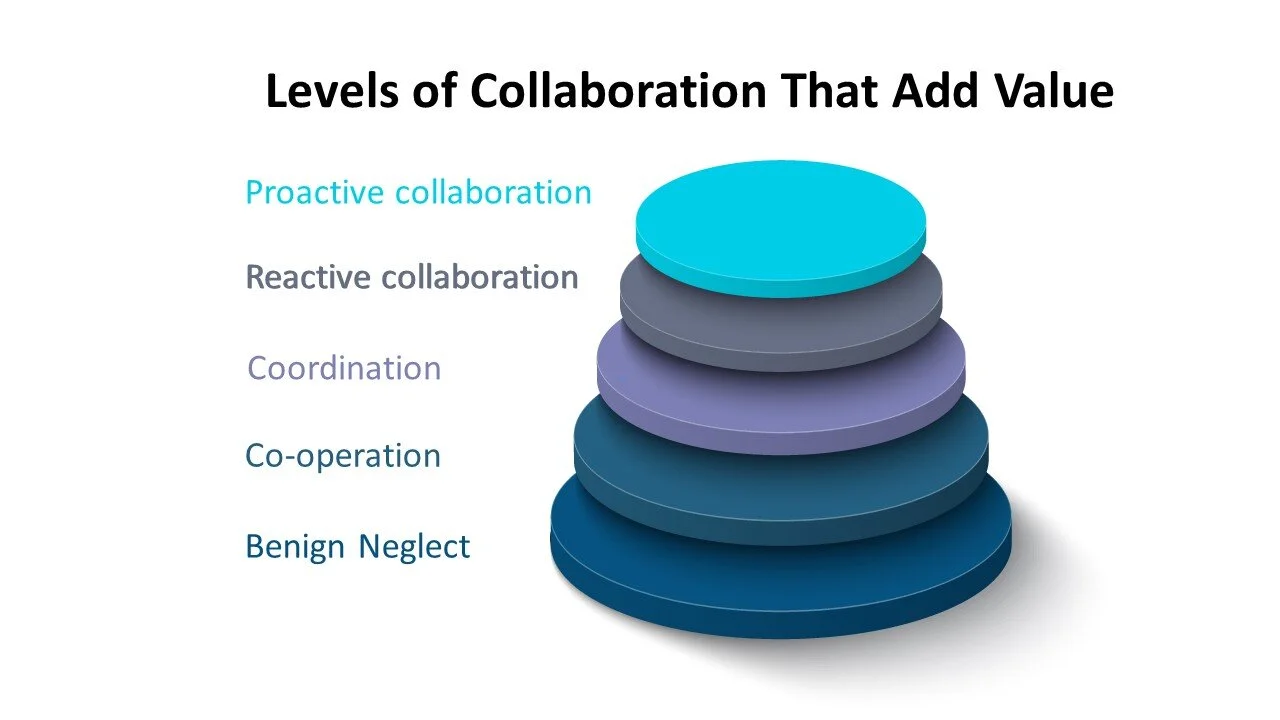Team greatness comes from regularly applying ideas, but It’s only sustained by teams learning to learn together. When a group finds its rhythm of learning, the payoff is massive. Work products and team dynamics improve. Relationships deepen. The bar of success is continually raised. A team spirit emerges that’s lasting and meaningful to everyone. That’s good news for the team as a whole, for each team member and for the organization.
Read MoreSome groups don’t do much work together because they don’t need much collaboration to succeed. Others, like the automotive design group, work together most of the time because if they don’t they won’t achieve their goals. Would you manage the highly independent sales team the same way you’d manage the highly interdependent car design team? Of course not. Know what sort of collaboration is required and tune your team development efforts to it.
Read MoreIf teamwork is a reaction, it’s collaboration as an after-thought.. The most powerful collaboration is proactive and intentional. Great groups figure out in advance which work they must do together, they plan for and create the space for collaboration. They’re equally clear about which work is better done by individuals. They check in with each other and stay in front of the work.
Read MoreThe words, “team” and “teamwork” have become hollow jargon and overused hashtags. I call it “teaminess”, and a waste of money. Collaboration is the foundational element of all group work. Whether you call yourselves a team, a group, a community or a committee, what matters is knowing which work requires collaboration – and which doesn’t. Then it’s about getting the right people involved in the right ways. It’s simple, it’s practical and it makes genuine collaboration possible.
Read MoreWhen we can connect with others around meaningful work and produce better results that we can all be proud of, that’s just good for everybody. That’s why I do this work, that’s why we need to start this quiet revolution. The invitation is open. Join me, won’t you?
Read MoreThere is a presumption that you have to build trust to create a great team. I see it differently. Trust is not a necessary precursor for effective teamwork. Trust is an outcome of people collaborating on meaningful work. Read this to find out more.
Read MoreThe key to this High Performance Collaboration framework is the insights and theories that lie behind it. The name of the Imperatives and Practices are just labels; we encourage you to adapt this Framework to your organization and culture.
Read More…As accurate as it was, descriptions of team needs weren’t going help people who just wanted to know what work had to get done, and how they ought to go about it. So, I wondered, “How could I augment Three Imperatives so we would have something teams could use to generate collaboration and teamwork?” They needed the actual Practices to . Allow me to describe the six practices and how they align with the three imperatives.
Read MoreWhat I learned through my research was that my well-intended alignment efforts weren’t helping collaboration. It wasn’t just about shared goals, I realized. To get more intentional collaboration, teams needed alignment. Then the Three Imperatives of Effective Collaboration emerged.
Read MoreThe levels idea had its genesis when I was working with a group of senior Mars HR folks in Europe. I wanted to see how people spoke about the ways they were working together. I looked at the data I’d gathered while and a pattern emerged. I organized my insights into what I now label the Levels of Collaboration. Here’s how to use the Levels to create value for your team.
Read MoreTypical team building can be fun. If nothing else it offers a break from the same-old, same-old back at the office or factory. But fostering “teaminess”, that shallow, short-lived version of team spirit, will not make your team better. If you want a stronger team work together on things that matter.
Read MoreTuckman’s Stages of Team Development may be useful for psychologically analyzing conflict, but not for helping a team get things done.. His stages are based on research that is no longer relevant, especially in the workplace. What’s more helpful: “What are we going to do?” or “What stage are we in?”
Read MoreInvolve the total team in a project only when involving everyone will create more value than having it done by a small group or by an individual. Stated the other way around, if a small group or an individual can do a piece of work effectively and efficiently, why bother involving the total team? Collaboration in large groups is slow, complex and prone to unproductive conflict. That’s why we save total team collaboration for instances where the payoff is clearly worth the added challenges involving more people.
Read MoreHow can we clearly differentiate among the varying degrees of collaboration? And how can we apply that knowledge to getting work done collaboratively? This Blogpost addresses:
The risk of burn out from what some are calling over-collaboration
Understanding that there are levels or degrees of collaboration leads to finding you need less collaboration that you thought.
How understanding these levels help you decide how to dedicate more time to the collaboration that matters and less time to the collaboration that doesn’t
Gets you to fewer meetings, fewer random emails or texts in the middle of the night
There’s a common fallacy that shared goals is how you do that. Goals motivate people, right? So shouldn’t it make sense that goals would do the same for people collaborating? I learned at Mars that it’s not so. Goals matter, but they don’t motivate collaboration.
Read MoreWe decided to tap into people’s motivational wiring in an unexpected way to get the opposite of what they normally preferred. Once we embraced this mind hack, we were able to build the framework and tools that did just this and enabled teams to get consistently better results.
Read MoreMy book is titled “Lessons from Mars”, and that is truly what it contains. Over 17 years as an associate at Mars, Inc., I was able to learn about teams hands-on and observe the effects of collaboration and team building strategies.
The culture at Mars was integral to my success in many ways, but three specific aspects made it the ideal environment for my research on team effectiveness.
I’ve said many times that my 17 years as an associate at Mars, Inc. was essential to the collaboration framework my colleagues and I developed and which led to the subsequent publication of my aptly titled book, Lessons from Mars. Serving as an internal effectiveness consultant gave me the opportunity to learn about Mars and its associates from the inside allowing me to truly understand the keys to effective collaboration.
Read More






